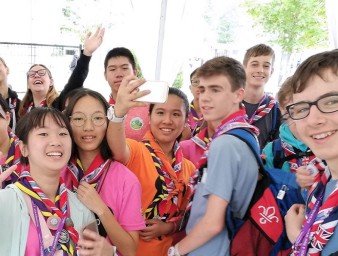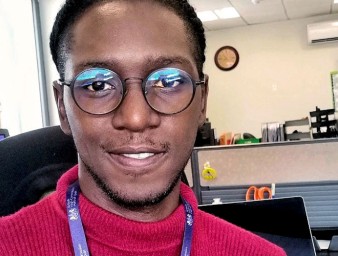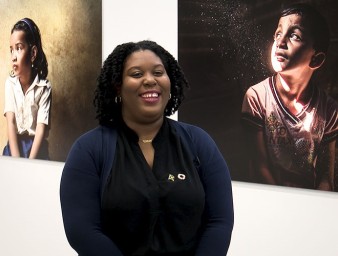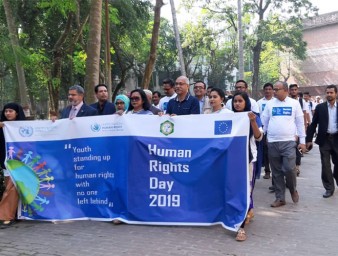Landmark agreement to promote and protect the human rights of youth in conflict
26 November 2021
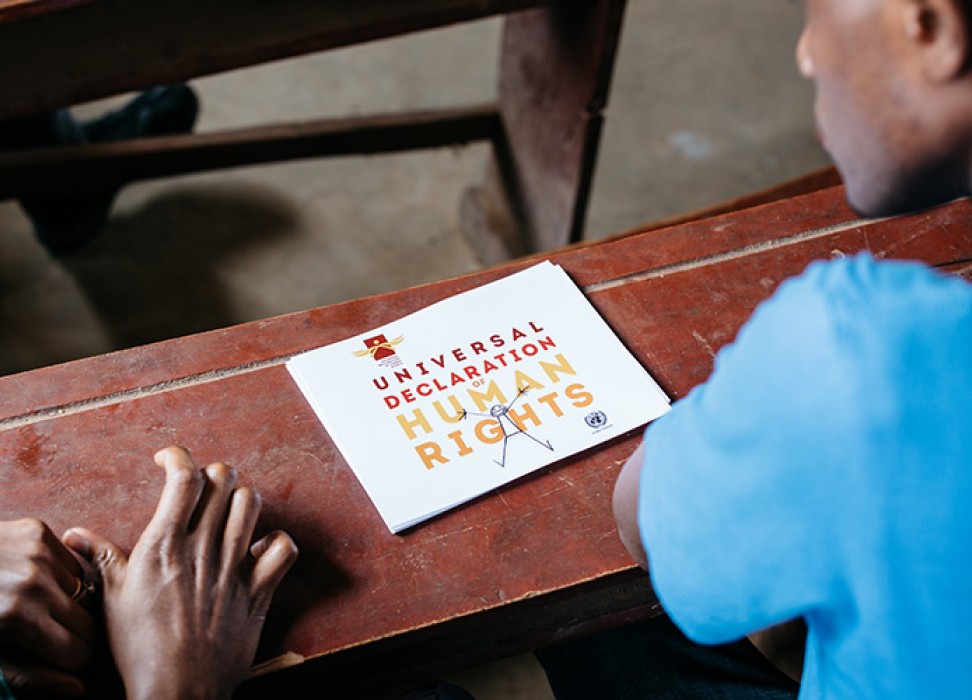
UN Human Rights, Education Above All Foundation and Silatech have partnered on a strategic project to promote and protect the rights of young people, especially those in vulnerable situations such as conflict, violence and insecurity.
“Young people are the present, not the future,” said UN Deputy High Commissioner for Human Rights, Nada Al-Nashif. “Across the world, they are exercising their rights to shape the decisions that affect their lives and societies, to access quality education, decent work and healthcare, to freely express their opinions and peacefully assemble without fear of harassment, intimidation or reprisals.”
“It is a crucial responsibility of us all as a global community to empower youth, and pay special attention to the most marginalized who are living in situations of conflict and insecurity,” said the CEO of the Education Above All Foundation, Fahad Al-Sulaiti. “Empowerment and respecting the agency of youth means that they must be treated as equal partners working with global leaders. Inclusive and quality learning opportunities are integral to provide the knowledge and skills that are essential for driving progress and achieving positive change.”
Through the project, the three partners will work jointly to create learning resources with the participation of young people themselves, through a Youth Advisory Board and a series of regional consultations, to ensure their ownership of the whole process. Once developed, the resources will be used in a series of capacity-building workshops for youth peacebuilders and advocates globally, providing them with the crucial building blocks to better understand and claim their rights. Young people will then return with their newfound knowledge and skills sharing what they have learned, thereby creating a ripple effect that reaches the most marginalized members of the community.
The CEO of Silatech, Hassan Al-Mulla, said, “I believe in the potential of young people to foster and precipitate change in the world. We are delighted to collaborate with and support our strategic partners UN Human Rights and the Education Above All Foundation in this project. We aim to provide youth living in marginalized communities, particularly those affected by conflict and violence, with the entrepreneurial capacity to catalyse positive and equitable societal changes and to sustain the livelihoods of marginalized youth by contributing to the construction of a better future for all.”
Promoting equitable, peaceful and prosperous societies with and for youth
According to field research and workshops conducted by the Education Above All Foundation, marginalized grassroots communities affected by conflict and insecurity urgently need quality learning materials and knowledge of human rights, advocacy, and sustainable peacebuilding.
Aryemo-Esther Ambrose, a 24-year-old living in the Kiryandongo Refugee Settlement in Uganda became a youth peacemaker in 2017 after a series of trainings with the Whitaker Peace and Development Initiative, a strategic partner of Education Above All. As a peacemaker, she now conducts community dialogues and capacity building workshops on human rights and peacebuilding for members of her community.
“The main challenges that youth face today are a lack of access to quality education because of cost, leading to a lack of employment opportunities, as well as limited access to information on human rights including sexual and reproductive health and rights,” Ambrose said.
“I am excited the project will bring youth together and empower them through building their capacity on fundamental human rights and giving them life skills to become resilient, productive and peaceful, positively contributing to achieving the Sustainable Development Goals,” she added. “The initiative will go a long way to inspire young people to promote sustainable peace among youth and in the community. This is a great initiative; it will strengthen the skills, knowledge and understanding of young people to confidently stand up and advocate for better actions that are youth-focused in our community.”
Multiple barriers to youth rights: conflict, violence and COVID-19
Last year, the Global Survey on Youth and COVID-19 showed that the COVID-19 pandemic has had a detrimental effect on the rights of young people, in particular those relating to their social, cultural and economic integration.
According to the International Labour Organization, prior to the outbreak, around one in five of the world’s youth were not in employment, education, or training, and youth unemployment rates were about three times higher than the rest of the working population. With the economic fall-out of the ongoing COVID-19 pandemic, young workers have faced yet another terrible blow, especially those employed in the informal economy in low-paid, precarious jobs.
Areej Al Masry is a young human rights defender who lived the horrors of the civil war in her home country, Syria. When she fled the conflict, Al Masry had the opportunity for educational and economic empowerment and now she is at the forefront of advocating for the rights of young Syrian refugees, so they can all enjoy their human rights, without discrimination. She said the ongoing conflicts and instability in the Middle East have caused young people numerous challenges, including an uncertain and unsafe living environment that lacks human dignity and the opportunity to continue their education.
“Although, many of these young people hold respectable degrees in different fields, most of them are not able to join the labour market,” she said. “Refugees, those who are under temporary protection and those who hold no legal status in the host communities face the same difficulties. And because of the minimal efforts devoted to the integration process in some countries, they are more exposed to prejudice, unfairness, and social rejection.”
“I hope that this project will help youth, particularly those who have fled their home countries during conflict, find a better life opportunity where their rights can be met,” Al Masry continued. “Empowering these young people and giving them opportunities to continue their education and to work will help them to be self-reliant and create their future, contributing to building sustainable peace in the long run.”
Technology and innovation will play a significant role in this project, especially to reach the most marginalized communities among us. “Technology undoubtedly continues to play a far greater role in the reach and development of young men and women,” continues Al-Mulla. “In particular, those living in vulnerable economic environments where young people comprise the majority of the population who are seeking to work, learn, upskill, innovate, and take advantage of the accessibility offered by emerging technologies to develop their skills and attain competitive employment opportunities.”
“UN Human Rights has been working alongside young people to promote and protect their rights,” Al-Nashif said. “Our partnership with Silatech and Education Above All will enhance our joint commitments to working with young people and particularly those in vulnerable situations, to co-create resources that will enhance their human rights knowledge and advocacy skills, and ultimately empower them to stand up for their human rights.”
“The tripartite partnership is a timely opportunity to take concrete action based on our belief in the power of youth: to harness their extraordinary passion, drive and commitment to building more equitable, peaceful and prosperous societies for all,” said Al-Sulaiti.
